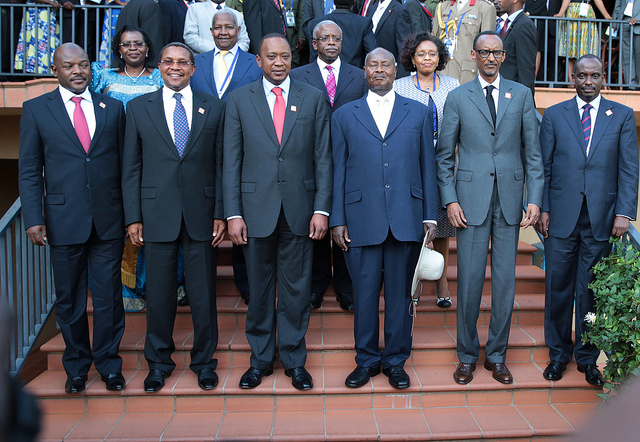|
|
By Isaac Mwangi
Arusha, 12 December 2015 (EANA) – Apart from a few members of the re- gional
legislature, few people cared about November 30, which came and went – and
with it the opportunity for East Africans to celebrate their unity.
Members of the East African Legislative Assembly are said to have spent the
day holding talks with various private- sector stakeholders in Kigali,
Rwanda. But this is an occasion that ought to have attracted a lot more attention across the region, spearheaded by the East African Community
(EAC) Secretariat. The day provides the ideal opportunity for all
stakeholders to take stock of the successes and shortcomings of the integration effort.Previous surveys about the public€™s awareness of the integration process
have revealed that there is a dearth of knowledge to do with regional initiatives. This is despite the many strides that have been made toward integrating the economies of the five partner states –Kenya, Uganda, Rwanda, Burundi and Tanzania.
It is these strides that we should have been celebrating –and in the
process bringing greater public partici- pation and goodwill to the process.
More people need to be involved in craft- ing the way forward, from students
to professors and traders to artisans. Indeed, there is much to celebrate. There is both a Customs Union and a Common Market in place. The full im- plementation of the East African Monetary Union is scheduled for 2024, when the single currency regime is expected to take effect. And there are
already moves to prepare the ground for eventual political federation thereaf- ter. There is also a lot of work that has gone into harmonization of standards, laws, operating procedures, manuals and other details that affect specific sectors. This has been done with the collaboration of national ministries
and institutions. It has also taken up much commitment by EALA. Much has been achieved, but more remains to be done to harmonize all possible
sectors. But there have also been numer- ous obstacles, which have sometimes seemed to
be insurmountable. The non-tariff barri- ers (NTBs) are a never-ending
problem, perhaps the most intractable of the challenges the Community faces today. Every time the partner states agree to get rid of some NTBs, new
ones crop up to take their place. It is a matter that puts into question
the commitment of the region to operate as one Common Market.
But there are other serious areas of dis- agreement as well. The pace of integration has raised concern, to the point of near break-up as countries aligned themselves into those of the coalition of the willing€ against
those perceived to be dragging their feet. This has sometimes poisoned the political environment and hindered progress. It has also wrought confusion as countries move unevenly in the inte- gration effort.
Rwandans, Kenyans, and Ugandans can now visit each other with ease and do
not need passports to do so, yet this does not apply to Tanzanians and Burundians. While this is acceptable within the framework of the EAC
Treaty, it does not augur well for rela- tions between our sister states.
Land is yet another emotive subject. There are perceptions that this important resource may end up being monopolized by those from more ad- vanced
economies who have the capital, to the detriment of local communities. Yet,
if we are truly integrating our econo- mies, how can any country open up some
areas and refuse to do so with others? Politically, there has been a lot of good- will among our leaders, which has somewhat made it easier to conclude many of the protocols and agreements signed. But this has also come at a cost –that our leaders will shy away from criticizing each other even where the situation clearly demands it. A pertinent example is Burundi, where
President Pierre Nkurunziza’s greed for power is slowly driving the country toward genocide.
Moreover, the stifling of democracy has not raised the ire of any of our
leaders. Instead, each of them is busy entrenching their own positions,
often through blatant disregard of dem- ocratic principles and processes.
Weak national institutions are not the way to go; instead, the region
should be finding ways of strengthening national and regional institutions
that will provide checks and balances in a future federation.
These are issues that need to be debated by all East Africans. Hopefully,
those concerned will seek innovative ways of increasing awareness and raising debate, including making use of the EAC Day in future.

